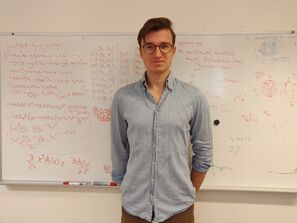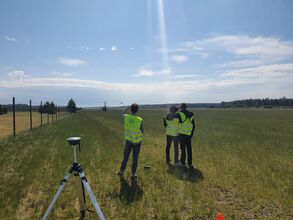Collaboration with Industry and Organizations
for mutual benefit
There are many ways in which industries and/or organizations collaborate with the department, some are linked to our educational activities others to our research activities.
- Hosting a Master's Thesis / Degree Project
- Project Work within a Course
- Guest Lectures and Company Visits
- Industrial PhD student
- Partner in a Research Project
- Affiliated/Adjunct positions
This page describes these options for collaboration in more detail.
The Industry Club is a way for Industry and Organisations to stay in touch with us, to follow our work, and to discuss collaborations with us. You can also contact us at industryclub@control.lth.se
in theory and practice
Our collaborations span a wide range of activities, from mathematical theory to experiments in the wild, and many of us work on both kinds of projects. As one example, Marcus Greiff is shown in the two figures below.


Left figure: To the best knowledge of the authors, we are the first to present an output feedback for the tracking control problem of quadrotor UAVs for which uniform almost global asymptotic stability results are derived."
Right figure: Field experiments at various sites around Gävle where UAV control and sensing technologies are used to search for remnants of the Chernobyl nuclear disaster.
Collaboration in Education
These forms of collaboration works with students in first- and second-cycle education, and our Director of Studies for first- and second-cycle education, Anton Cervin organizes and coordinates many of these activities.
Master's Thesis / Degree Project
Hosting a master's thesis project (or degree project as it is formally called) is the most common form of collaboration between LTH and industry within education. A master's thesis project is an independent project for students (often working in pairs) to develop specialised knowledge within a subject, and it corresponds to 20 weeks of full-time studies. In the project, the student should integrate knowledge from many different courses and acquire new knowledge. The results should be of interest both to the client and to a wider audience. For Master's Theses at the Department of Automatic Control, the project should be related to systems and control engineering in the broad sense, and can include, for instance, modeling and simulation, machine learning, design and optimization, as well as real-time implementation.
Project Work within a Course
Several of our courses contain projects, including Project in Automatic Control, Applied Robotics, Mathematical Modeling, Real-Time Systems, and Project in Systems, Control and Learning. The aim is to let the students apply their knowledge and skills on realistic problems, working in project form. A course project in industry could serve as a preliminary investigation, which could later be extended into a master's thesis project. If you believe that you have suitable industrial projects or case studies, please contact us.
Guest Lectures and Company Visits
Guest lectures from industry and organisations and company visits are always a welcome addition to our courses for engineering students. We have frequently had industrial guest lectures in some of our courses, including Real-Time Systems and Systems Engineering / Process Control, and our students would appreciate to have even more. Please contact us if your company is interested in contributing to our educational activities.
Collaboration in Research Projects
These forms of collaborations work with our PhD students and with faculty staff. Our Director of Research-studies Pontus Giselsson, and our Head of Department Anders Rantzer, organise and coordinate many of these activities.
Partner in a Research Project
A partner in a research project, works together with us in formulating research questions, submitting proposals to funding agencies, and, if the application is accepted, work together with us throughout the project in order to deliver the goals formulated in the proposal. The research partners also participate in the research project's advisory board. Examples of funding agencies are: VINNOVA, Vetenskapsrådet, European Research Council, etc. Good contacts with industry, regional councils and other non-governmental organisations has been key to establishing a number of projects with external partners.
Industrial PhD student
An industrial PhD student is employed by the company while performing PhD studies at the department. They work with the department and company on research topics of interest to both. The department currently has several industrial PhD students, and while employed at the company, some are funded through the WASP organization.
The department currently has Industrial PhD students working with Axis, Ericsson, and SAAB.
Affiliated/Adjunct Staff
Affiliated staff are fully employed at a company but are affiliated with the department (usually 20%) for a limited time.
Adjuct staff are employed part time at a company and part time at the department, and that time can be spent on teaching, supervising PhD students and working on research projects. The adjunct position can be as adjunct lecturer or adjunct professor.
The department has a long and profound collaboration with Ericsson which is, among other activities, also maintained via our adjunct professor, Johan Eker, spending 20% of his time at the department.
Policies and Standards
Our researchers participate in the development of international policies and standards. They participate by holding position in these organisations and/or councils, or they participate though invitations as experts.
- Chair of ISO/TC184/SC5 (Industrial interoperability)
